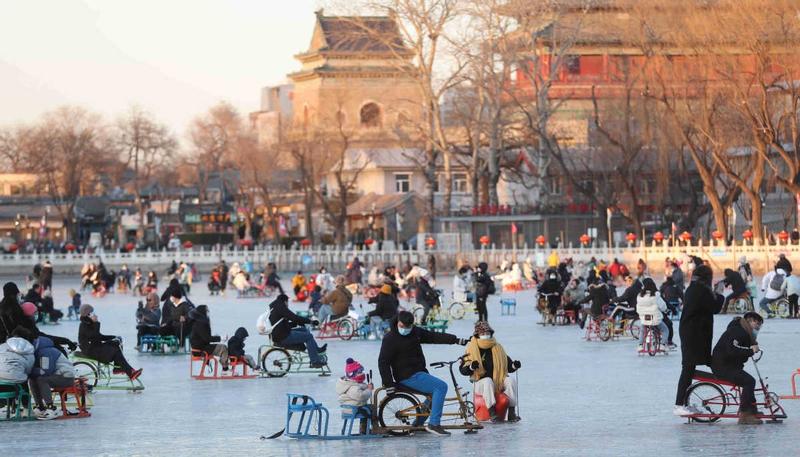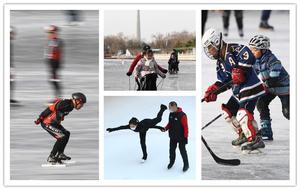Leaps, spins and turns practiced on capital's lakes
 Shichahai, a popular scenic area in Beijing, is a venue for a wide range of winter activities. (ZOU HONG / CHINA DAILY)
Shichahai, a popular scenic area in Beijing, is a venue for a wide range of winter activities. (ZOU HONG / CHINA DAILY)
Countless children growing up in Beijing enjoy ice skating in winter, with the sport well established as a seasonal tradition.
It is especially popular in the capital, and despite the challenges posed by the COVID-19 pandemic, it delights participants of all ages keen to test their abilities.
On Saturday, ice rinks in the Shichahai area, one of the city's most popular outdoor skating venues, officially opened to the public, attracting many weekend visitors.
Skating rinks have been marked out on two of the three lakes in Shichahai-Qianhai and Houhai-that cover a total of 160,000 square meters. Visitors can rent skates, ice bikes and ice sleds.
The areas around Qianhai Lake and Houhai Lake have daily visitor capacities of 3,000 and 5,000 respectively.
Visitors' temperatures are checked before they enter, and they must wear face masks, according to the Shichahai Tourism Development Co, which manages the rinks in the area.
Beijing resident Li Cheng, who took his twin sons to Shichahai on Saturday, said: "These rinks have opened three weeks later than usual this year because of the pandemic. Many people, including myself, have been looking forward to this day."
His 7-year-old sons started to learn ice skating about two years ago after they mastered roller skating. Although the two activities require different skills, the boys learned quickly and greatly enjoy both sports.
Li, 55, fell in love with ice skating when he was 11.
Every winter and summer vacation during his childhood, he visited his parents in Changchun, capital of Jilin province, where they taught at Northeast Normal University.
"I remember the first time I went ice skating on a lake. It was freezing and the sun was so bright that I couldn't open my eyes. My parents bought me a pair of black ice skates, and I was very excited when I set foot on the frozen lake," Li said.
"Some children my age were playing on the lake. Although we didn't know one another, we soon became friends after we started ice skating together. It is a great place to make new friends."
Li enjoyed his first taste of ice skating so much that he forgot the number of times he fell on the lake. As he lay on the icy surface, he gasped and laughed happily before quickly getting back on his feet again.
"I taught myself to stay balanced on the ice, to move in different directions and gain speed. I felt as if I were flying-it's not easy, but I was very excited when I mastered a new skill," he said.
Li skated for about six hours a day for two months. After returning to Beijing, he went in search of ice rinks to practice his spins.
Shichahai is a popular scenic spot, where visitors get a glimpse of old Beijing.
The area boasts tall trees, gray walls, winding hutong (alleyways) and courtyards, where people go about their daily lives. They buy daily supplies at closet-sized stores, build nesting areas for pigeons on their roofs, and visit neighbors while still wearing their pajamas.
Before the Yuan Dynasty (1271-1368), the water area in Shichahai was known as Haizi.
In its heyday, Shichahai, which also comprises Xihai Lake, formed the northern part of the Grand Canal, connecting Beijing with other cities in China. Wooden boats carried goods from the south of the country to the imperial capital, transforming the area into a busy commercial center.
In summer, the area is popular for strolling and boating, with visitors enjoying live music and local food at lakeside bars.
Li said: "The rinks in Shichahai are quite different from those in Changchun, which are much wider, but I love to go ice skating in Beijing every winter. It's such a popular seasonal activity, and was especially so in the 1980s.
"It's just a pity that winter in Beijing is relatively short and outdoor ice rinks are only open to the public for about four or five weeks.
"I'm glad that my sons love ice skating as much as I do and that they will continue the tradition."
 Ice skaters and hockey players practice outdoors in Beijing. (WEI XIAOHAO / CHINA DAILY)
Ice skaters and hockey players practice outdoors in Beijing. (WEI XIAOHAO / CHINA DAILY)
Great place
Deng Xuanhui, 25, who works for an internet company in Beijing, visited the Shichahai rinks on Jan 9 with three friends. "It is a great place to have fun and spend some time," he said.
"Although I've lived in the capital for three years, it was the first time I had skated in Shichahai," said Deng, who was born and raised in Nanjing, capital of Jiangsu province, and graduated from Beijing Institute of Technology.
"I'd heard a lot about ice skating in the city, as some of my friends are Beijing natives. It's a trademark outdoor winter activity, which I don't want to miss."
When the city saw its first snow this winter in November, Deng started to look forward to going ice skating with friends on the Shichahai rinks.
"It's fun to watch happy skaters of all ages on the ice, some pulling each other across the lake on wooden chairs and others just gliding gently along, some of them arm in arm. The atmosphere is great," Deng said.
He added that he takes many photos and videos of ice skating, which he edits and shares on social media platforms.
After he finished ice skating for the day, Deng and friends had dinner at a restaurant near the rinks.
The first ice rink to open to the public in Beijing this year was at Bayihu Lake in Yuyuantan Park in the west of the city.
The lake covers more than 80,000 square meters, and in addition to ice skating hosts other seasonal sports, including hockey and winter swimming.
Zhao Xiang, an official with the Beijing Municipal Water Affairs Bureau, which manages the rinks on Bayihu Lake, said: "To create a safe and healthy area for ice skaters during the pandemic, we separated the rinks into two zones. One has a daily capacity of 1,000 people and the other, which is free of charge, is limited to 200 people per day."
Ten rinks will be open to the public in Beijing this winter, said Zhao, who is deputy director of operations and management in the bureau's water projects department.
Wang Xueli, director of Tsinghua University's Center for Development of Sports Industry, said ice sport was traditionally known as bingxi in Chinese, which translates as "playing on ice".
With Beijing preparing to host the Winter Olympics next year, the center, which was founded in 2016, has been promoting winter sports, especially among young people.
These sports were regularly performed for imperial families, especially during the Qing Dynasty (1644-1911). When people from ethnic groups moved to Beijing from northern areas of China, they brought their traditional seasonal sports, including ice skating, with them.
In addition to outdoor rinks, ice skaters practice at indoor venues, which are often packed, have glitzy lighting and pulsating music.
Last summer, Ji Kaifeng, a 75-year-old Beijing native, become an internet celebrity.
The former photographer, who took up ice skating when he was 8, has visited the China World Shopping Center's indoor rink since it opened in 1999. He drives to the venue every day from the nearby neighborhood of Shuangjing.
Wearing headphones while he skates, Ji listens to Russian songs, including Moscow Nights and Katyusha. Sometimes, he carries a pair of silk fans while he skates to various dance moves.
His video, in which he skates to Japanese composer Ryuichi Sakamoto's work Merry Christmas Mr. Lawrence, has attracted more than 3 million views on Sina Weibo, earning Ji the nickname "Mr. Lawrence on Ice".
"I went ice skating a lot in Beijing when I was young. It was fun, but I didn't expect it to become my daily routine," Ji in an earlier interview.
He added that Beijing has many outdoor rinks for the public, including those at Taoranting Park, the Old Summer Palace and Beihai Park. "However, the indoor rinks obviously allow me to skate throughout the year," he said.
Ji, whose 15-year-old son died in 1990 from a heart attack, added: "I enjoy the speed when I move on the ice. Skating brings me relief."
In the zone
An ice skating coach, surnamed Ning, at the China World Shopping Center rink said: "When Ji is ice skating, he is totally in the zone. It's hard not to watch him on the ice.
"After his video went viral, many visitors came here to see him. His passion for ice skating has inspired numerous people to take up the sport.
"Ice skating is accessible to everyone. It is a lifelong healthy activity for all ages and is good for the joints, flexibility, coordination and burning calories," said Ning, 30, a former professional figure skater.
After leaving the figure skating team, Ning, who started to learn ice skating when she was 4, performed in ice dancing shows.
She has coached the sport for three years and most of her students are 5 to 12 years old.
"I've always wanted to share ice skating with more people," she said.


